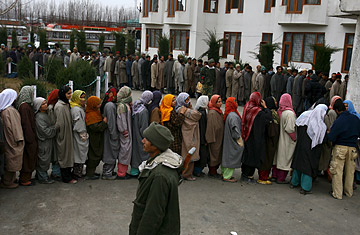
An Indian paramilitary soldier stands guard as Kashmiri Muslims stand in a queue to cast their votes outside a polling station in Srinagar, the summer capital of Indian Kashmir, 24, December, 2008.
Election day in Srinagar, the summer capital of Indian-administered Kashmir, brought thousands of people onto the streets — but a majority of them appeared to be in uniform, armed with assault rifles and long bamboo sticks. enforcing strict security restrictions. Security was tight for the final phase of a staggered poll that will elect an 87-member Jammu and Kashmir Assembly to a six-year term. The atmosphere on the streets, and inside the heavily-policed polling stations, was predictably tense, but unlike in previous elections, the main security threat this time came not from Pakistan-backed militants but from disgruntled locals who have taken to the streets this year to vent their anger against Indian rule. That anger translated into an election boycott that failed to keep 60% of voters away from the polls throughout the territory, although it did prompot a majority stay away in parts of Srinagar.
At one point on election day, crowds had gathered to chant "we want freedom", but they were driven off the streets of Srinagar by policemen wielding bamboo sticks and firing tear gas. Anti-India sentiment runs deep in Srinagar, where most people favor either independence or a merger with Pakistan. But outside the old town, a moderate polling was underway, as people lined up to vote, they said, for better roads and drinking-water supplies, an end to frequent power cuts and more job opportunities for the region's unemployed youth. (See images of Kashmir's previous election)
Voting in earlier stages of the election had been largely peaceful, with a higher-than-expected turnout of more than 60%, though scattered anti-India protests continued throughout the staggered election process. On November 17, more than half of over 600,000 eligible voters cast their ballot in the first phase of voting in the hilly districts of Bandipore, Leh, Kargil and Poonch, all of which border the Line of Control that separates the Indian- and Pakistani-administered sides of Kashmir.
Large numbers of voters in other regions appeared to follow suit in rejecting the boycott call. New Delhi takes pride in this "constructive" change in the mindset of Kashmir's Muslim majority. India's Foreign Minister Pranab Mukherjee said recently in Srinagar, "It has been quite encouraging that a large number of people has come out to vote... It is significantly higher [turnout] compared to the elections held in the past which is a very important development. It shows people's faith in India democracy."
The positive turnout is all the more remarkable in light of the turmoil of recent weeks, which began in June when furious Kashmiris took to the streets in furious protest against the local government's decision to transfer a piece of forestland to a Hindu consortium. The completion of the final round of elections has left the authorities feeling vindicated: "The people have, once again, shown their faith in democracy, despite many constraints, difficulties and threats," said Jammu and Kashmir governor N.N.Vohra. "Indian democracy has triumphed yet again."
Still, even if the boycott proved weak, separatist voices are unlikely to be silenced and may be fueled by the tough security measures adopt to squelch dissent. The Kashmir Valley's chief Muslim cleric and leader of separatist Hurriyat Conference alliance Mirwaiz Umar Farooq termed the elections a "farce", and alleged ballot stuffing and other irregularities by by "goons" working for the government and various pro-India political parties. "India which claims to be the world's largest democracy stands naked before the International community after what was done and seen happening today," Umar charged. "They can't impose curfew and then hold elections under the barrel of a gun."
The election to the Jammu and Kashmir Assembly may have been successfully completed, then, but the underlying conflict over the region's status that has simmered since 1948 clearly remains unresolved.
